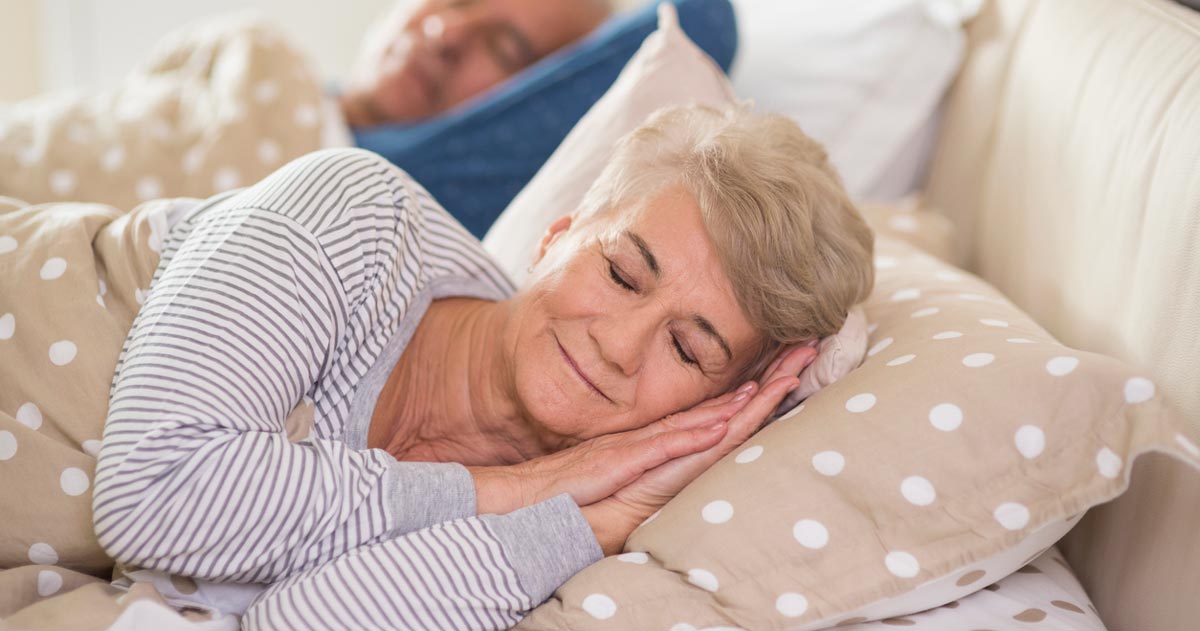Sleep isn’t just something we do when we’re tired; sleep is absolutely essential to senior health and well-being. According to the Sleep Foundation’s article, “How Much Sleep Do We Really Need?” the amount of sleep needed to stay healthy varies by age with seniors 65 years of age and older requiring 7-8 hours.
For many seniors, however, good quality sleep can become elusive for many reasons, including changes in circadian rhythms, different health conditions, medications, frequent need to go to the bathroom, and even grief. But with a little knowledge, seniors can sleep well and stay healthy. Here are tips for making the most of every night’s sleep.
Get help for insomnia
One of the most common sleep disorders in seniors is insomnia, which makes it difficult to fall asleep and stay asleep. One study noted complaints of insomnia as high as 50% among people ages 60 and over. For some, insomnia may occur only occasionally, but when it is prolonged it can become a serious problem.
The causes of insomnia are many and include stress, irregular sleep schedules, changes in the body’s circadian rhythm, caffeine, nicotine and alcohol, acute and chronic pain, medications, mental health concerns like post-traumatic stress disorder, and sleep-related health disorders like sleep apnea and restless legs syndrome.
Many seniors take sleep aids like melatonin or sleeping pills without really understanding the underlying cause of insomnia. These may help once in a while (when prescribed by a physician) but the best way to work through insomnia is to define why it’s occurring and address the causes with the help of a qualified medical professional.
A senior’s physician can assess the situation and prescribe the therapies and/or medications that are best for each individual’s personal needs. The Mayo Clinic article, “Insomnia” looks at the condition, diagnosis, and appropriate treatment options including different therapies and medications.
Maintain healthy sleep habits
A good night’s sleep is possible, especially if seniors maintain habits that set the stage. For example, bedrooms should be quiet, dark, and free of distractions like computer screens (yes that includes tablets, cell phones and Kindles!). Clocks and nightlights should also be placed so they are not in the line of vision and if necessary seniors can wear a sleep mask to ensure the least possible light.
Another good habit is to observe the same pre-sleep ritual every night. A warm bath, a little time listening to relaxing music or reading before bed can help slow the body down and encourage better sleep.
Also be sure to set the temperature to the optimum setting, which varies by season and age. While infants need a warmer temperature since they may not be able to regulate body temperature as well as adults, seniors sleep better at lower temperatures because they may have health conditions like hormonal swings, sleep apnea or others. Trying different temperatures is the best way to determine the one that works best for each senior.
To better understand the sleep/temperature connection, the sleep.com article, “What’s the Best Temperature for Sleep and Why Does It Matter?” is a great resource.
Watch what you eat and drink
Another interesting link is that between sleep and diet. Experts have long known that caffeine, nicotine and alcohol can negatively impact sleep, but science has now discovered what you eat and drink can also positively affect sleep. For example, just being well hydrated is conducive to better sleep, although it’s best for many seniors to drink throughout the day and avoid drinking too much water near bed time.
As for food, in one study of U.S. women and sleep, the Mediterranean diet factored into better sleep due to its high vegetable and fruit content and low amounts of dairy, fish, eggs, red meat, and poultry. Specifically, proteins are great sleep aides while sugars, carbohydrates and fats are not. Other great sleep helpers are fiber, magnesium, vitamin D, potassium, and omega-3 fatty acids. To learn more about how a good diet can improve sleep, read the Psychology Today article, “The Connection Between Diet and Sleep.”
Sleep and exercise
Exercise is key to good health at every age and seniors are no exception. And one of the best forms of exercise is also one of the easiest and safest for seniors: aerobic exercise. Also known as cardio exercise, aerobic exercise includes walking, running, jogging, swimming, cycling, and tennis. These exercises not only improve cardiac health, help lower blood pressure, and reduce chronic pain, they also contribute to better sleep. Get the low down on aerobic exercise in the seniorsmobility.org blog, “Cardio for Seniors: Best Senior Cardio Exercises.”
But just about any form of exercise will encourage better sleep thanks to the release of endorphins, the chemicals that help reduce stress and improve moods. And as long as it’s safe to exercise outdoors, getting sunshine boosts vitamin D, and the fresh autumn air is a wonderful addition to an exercise routine. For more about sleep and exercise, check out the sleep.org article, “How Exercise Affects Sleep.”
Senior health is essential to a great life and at Countryside our goal is to provide residents with every opportunity to sleep well and stay healthy and happy. For more information about Countryside, please call Margaret Nagel at (517) 206-5000 or download our brochure to learn about our care levels, cost, and amenities.


